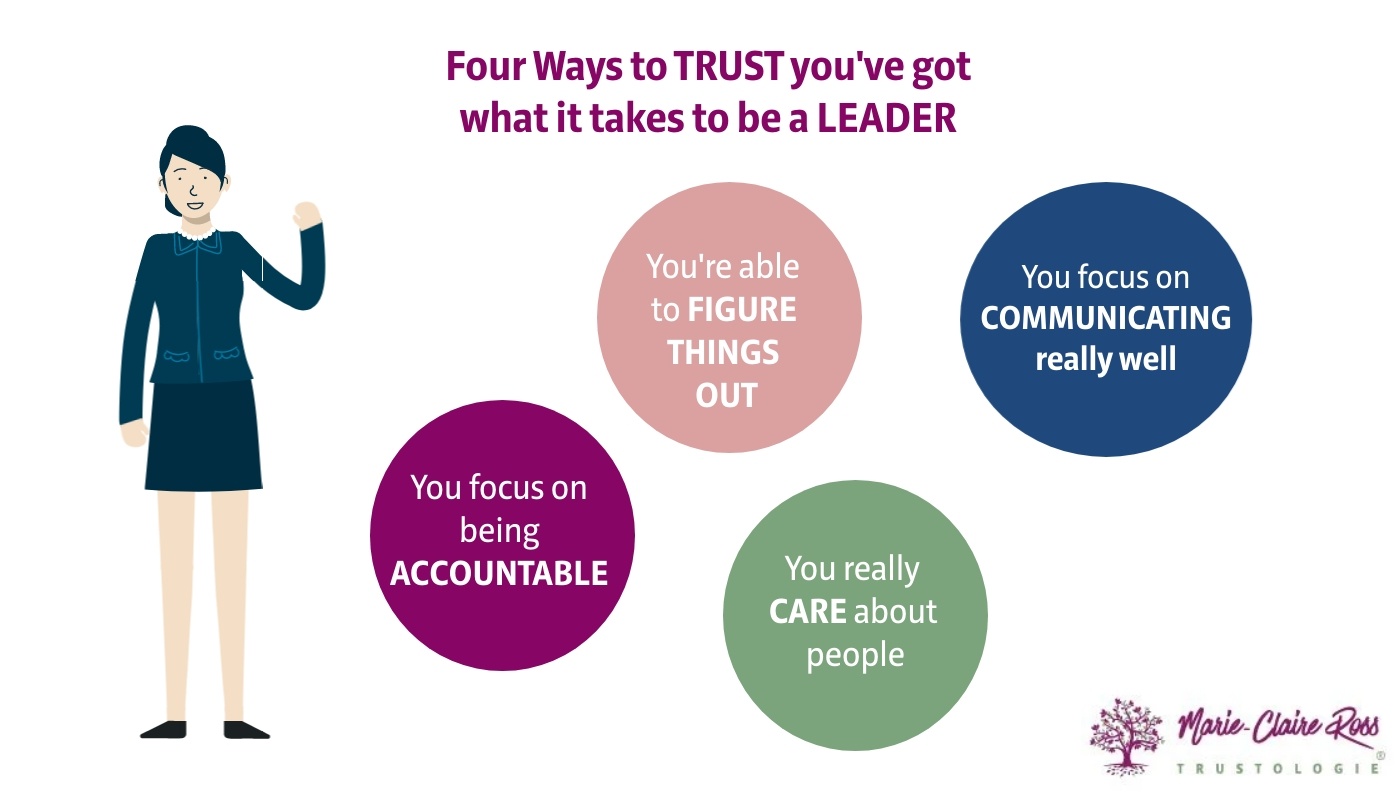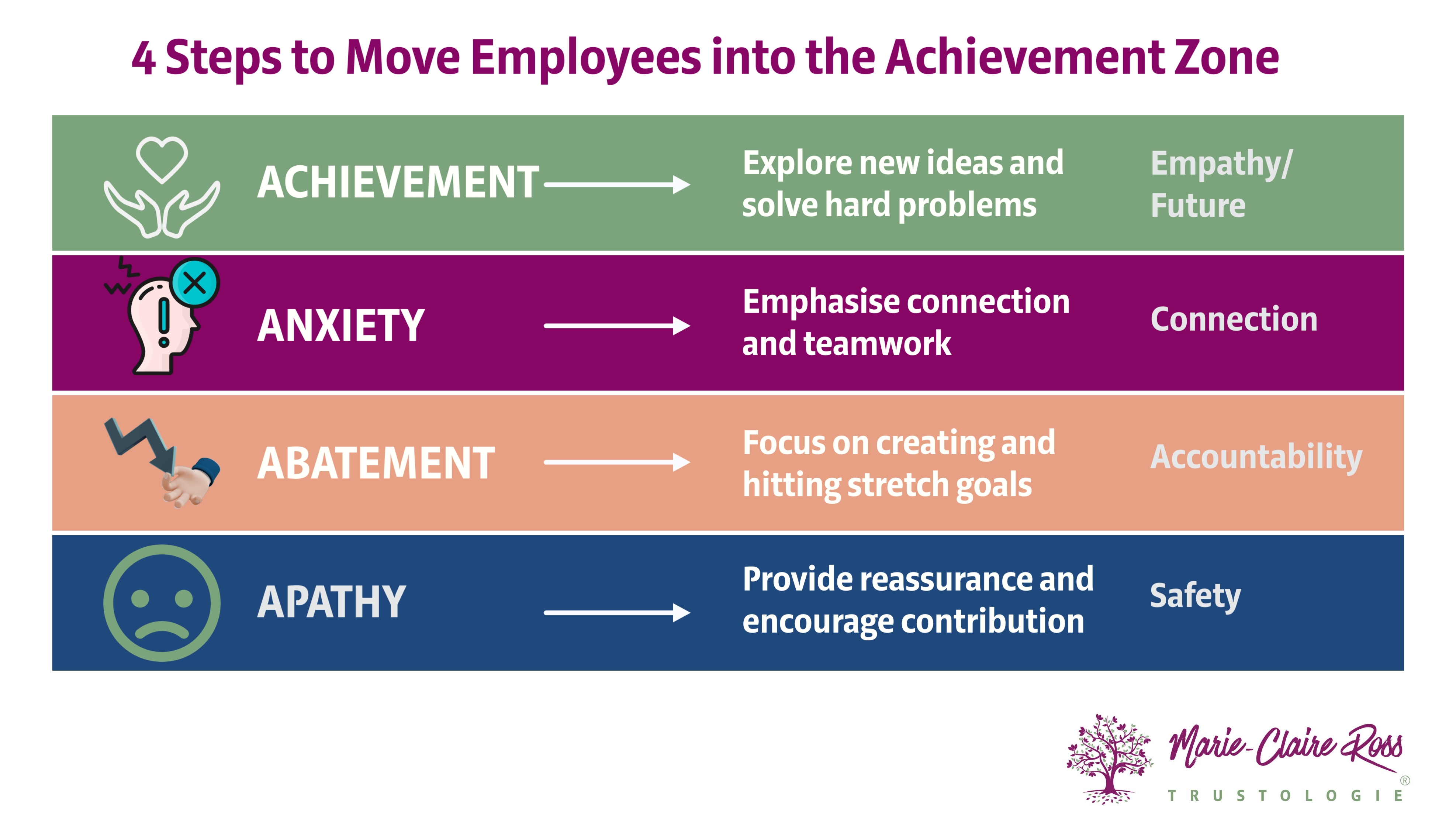11 min read
4 Practical Strategies for Better Emotional Management in the Workplace
I have a friend who often finds herself at the mercy of her emotions. Recently, she called me to rehash a confrontation she’d had with a group of...
Develop leaders, strengthen executive teams and gain deep insights with assessments designed to accelerate trust and performance.

Transform how your leaders think and perform with keynotes that spark connection, trust and high-performance cultures.

Explore practical tools, thought-leadership and resources to help you build trusted, high-performing teams.

Trustologie® is a leadership development consultancy founded by Marie-Claire Ross, specialising in helping executives and managers build high-trust, high-performing teams.

5 min read
Marie-Claire Ross : July 16, 2024

You may have thought that you were promoted to a leadership position because:
A. You were really good at your job.
B. You were the only person available when your boss went on maternity leave, got promoted, resigned or absconded with company funds.
C. You were popular with the higher ups (because you always made it to Friday night drinks).
D. You really don't know what they were thinking and you question their intelligence.
Now, if you're like most people one (or more) of these answers will resonate with you.
So now cue the feelings of being an impostor and that you don't know what you're really doing when work pressures or people problems get too much.
Well, the good news is you're not alone. According to Chartered Management Institute (CMI) research, 82% of new managers in the UK are “accidental managers.” Leaders who have received little management training. Put into a role more because of their tenure, rather than because of their actual potential to be a great leader.
Management training will improve your ability to lead - but what is probably most important is how your view yourself as a leader. And the stories you tell yourself.
Because I hear a lot of stories from people as to why they probably shouldn't be leading. They are all quite creative. There's a lot of people feeling really sorry for themselves and sometimes, just sometimes, their stories come with tears.
So if you are telling yourself all sorts of negative stories about why you shouldn't be leading, let's go through four things to improve your leadership conviction.

1. You're able to Figure Things Out
A common concern people tell me is that they aren't meant to be a leader because of some big issue they have with Ben the sales manager, or John the CEO, or the old processes that their company won't fix or the new person who doesn't listen to them.
Honestly, it doesn't matter who or what it is. What matters is that you believe you have the intelligence to work out a solution and find a way forward.
If you're able to do a Google search on a topic, read a book, listen to podcast, attend a workshop and apply what you have learnt to your leadership, guess what? You can actually improve your team experience and your job fulfilment.
All this takes is the belief that you have the acumen to find the resources your need, apply it, test it out and try again if at first you don't succeed.
Doesn't that sound easy? After all, you have probably done that hundreds of times. But it means recognising and reflecting on times you have done this at work (or even at home).
I have a student in my Leadership Mastermind who didn't believe she could lead. During a session with her manager, I discovered she was the only person in the organisation to learn a new procurement software quickly, that ensured supply chain issues could be averted.
Did she appreciate her ability to learn quickly and solve a massive problem in the company? No. Did it make a difference when I explained how she can improve her situation by learning and adapting? Yes.
So ask yourself: When did I last search for an answer to a sticky problem and then find an answer that solved it? What sort of a difference did that make to the output of my team? How can I do that again?
I meet a lot of leaders who are caring and supportive. They are really empathetic people who are loyal to the company and their people. They will always put everyone first, before themselves. They make sure they treat everyone well.
The good news is that a great leader supports others to do their best work in service of a shared goal. Employees want to feel that their boss cares about their wellbeing and their career potential. Customers want to feel heard and then issues resolved.
Unfortunately, if you care about people to get validation (so that they like you in return), you will find leading emotionally draining.
If you struggle to delegate tasks because you believe only you can handle them, leading will become overwhelming. Additionally, if you seek acknowledgment solely for tasks completed by you, rather than your team, you will find leading quite frustrating.
If any of those relate to you, then what's getting in your way is you. It's time to step back and let your people shine and teach them everything you know (so you can delegate and move on to higher impact work, that higher ups will really appreciate). That's what real caring is all about in the workplace - unlocking the value of others around you, so they can find themselves.
It goes without saying, but we all like leaders who have clarity - who communicate clear directives, expectations and a compelling vision.
Communication is all about reducing uncertainty. Without it people fall into distrust and confusion.
Most people will tell me that they need to improve their communication skills, in order to improve their leadership. The good news is learning how to delegate well, run a meaningful meeting and one-on-one's, give and receive feedback and communicate a future vision are all skills that are learnable.
The secret is to spend time contemplating what truly matters for your organisation, what needs to be done and how to inspire each person in your team. If you make time to do that, then know you have what it takes to be a great leader.
Clear thinking always precedes clear communication.
Ask yourself: How can I schedule time in my calendar to think through how I can add value - to my people, to my team and the organisation, so I can communicate better?
Most leaders proudly tell me they are accountable. However, while they might have been accountable as an individual contributor, it's a completely different ball game to ensure your team is accountable as well. Being accountable for your tasks is no longer enough.
It requires self-awareness - being aware of when your team is delivering on time and at quality without making excuses.
It requires clear communication. Communicating clear expectations, delegating wisely, and acting on feedback, as well as having difficult conversations.
It requires continuous improvement. Establishing clear metrics and regularly evaluating performance against these metrics. This requires tracking progress, celebrating achievements, and addressing areas needing improvement.
Ask yourself: Am I setting a good example of accountability through my actions and decisions? What feedback have I received from my team, and how am I using it to improve? What areas of my leadership can I work on to enhance team accountability?
It is totally normal to question whether you have got what it takes to be a leader from time to time.
The trick is to not wallow for too long and to work out what it is you want and the steps to get there. All it takes is reframing the negative stories that will drag you down if you let them.
Great leaders really care about unlocking people's potential, they feel confident that they are smart enough to find a solution, they take the time to customise clear communication to each member of their team and hold everyone accountable.
If you do any those, then take some time to reflect on how you do that well. Tell a positive story about how you've got what it takes to be a leader.
And remember, you are in charge of this team for a reason. Management believes in you.
And if you feel that you could really do with some help around delegating, having difficult conversations, receiving feedback, running meaningful meetings or one-on-ones, then come and join my Leadership Mastermind that is starting again later next month.

11 min read
I have a friend who often finds herself at the mercy of her emotions. Recently, she called me to rehash a confrontation she’d had with a group of...

9 min read
True leadership presence isn’t a performance or a set of charisma hacks; it is the felt experience of who you are being in the room. By cultivating...

13 min read
As teams return from their summer (or winter) break, you may notice subtle shifts in your team’s energy. Even if the end of year was positive, a new...
.png)
Our brains are naturally wired to seek out certainty and a sense of safety.

Recently, one of the biggest complaints that I have been hearing about leaders is how a lack of self-awareness is impacting their performance....

One of the major frustrations of being a safety leader is that it's often difficult to get your safety messages understood and acted upon correctly.